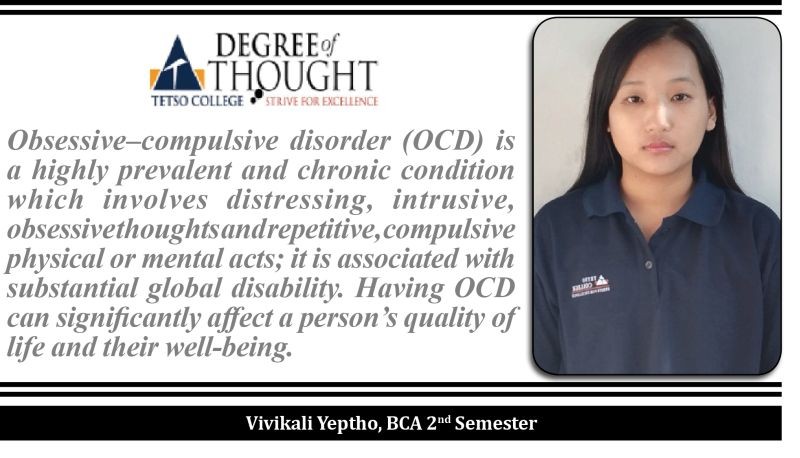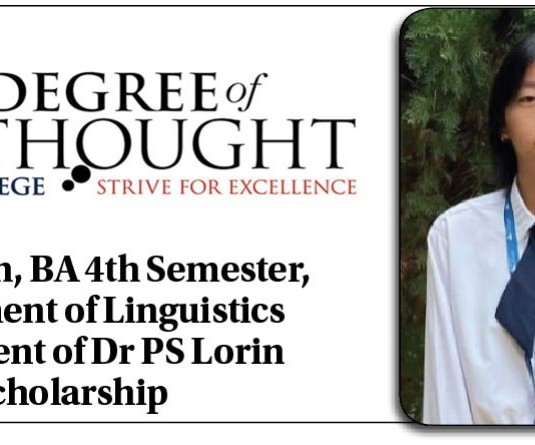
OCD is a mental and behavioral disorder in which a person has certain repeated thoughts called obsession or feels the need to perform certain routines repeatedly called compulsion to an extent where it induces distress or impair one's general functioning.
This article will deal with all that we need to know about OCD.
Statistics of OCD worldwide: Approximately 2 to 3 % of the world’s population suffers from OCD. The disorder is said to be equally common in male and females.
Signs and symptoms of OCD:
People with OCD may have obsessions, compulsions or both.
Obsessions are repeated thoughts, urges or mental images that cause anxiety. Common obsessions include:
- Fear of germs or contamination.
- Fear of forgetting, losing or misplacing something.
- Fear of losing control over one's behavior.
- Aggressive thoughts towards others or oneself.
- Unwanted, forbidden, or taboo thoughts involving sex, religion or harm.
- Desire to have things symmetrical or in perfect order.
Compulsion are repetitive behaviors that a person feels the urge to do in response to obsessive thoughts. Common compulsion includes:
- Excessive cleaning or hand washing.
- Ordering or arranging order in a particular, precise way.
- Repeatedly checking things, such as the door is locked or the oven is off.
- Compulsive counting.
Types of OCD: Based on the nature of the symptoms experienced, OCD can be divided into different OCD subtypes. There are five main categories of OCD with numerous subtypes within each category. Five main types of OCD are:
- Contamination
- Ruminations
- Intrusive thoughts
- Checking
- Hoarding (i.e., difficulty in discarding or parting with possessions because of a conscious need to save them)
Root cause of OCD: Despite a wealth of research, the exact cause of OCD has not been identified. OCD is thought to have a neurobiological basis, with neuroimaging studies showing that the brain functions differently in people with the disorder. An abnormality, or an imbalance in neurotransmitters, is thought to be involved in OCD.
OCD and society’s misconception: Although society has gotten more comfortable with speaking about mental disorders, OCD is still commonly misinterpreted.
The term OCD is often mistaken as a substitute phrase for preferring something a certain way, or for wanting basic control of a situation like the cleanliness of your room or how you organize things. It’s true that these traits can be a part of OCD symptoms, but they are a small part.
What OCD really is, is a cycle of repetitive, intrusive thoughts or actions that can cause distress and anxiety.
Instead of being recognized and treated like the actual mental disorder, it is often brushed aside as another phrase that one can use when they want to be picky about something.
Is there a cure for OCD? How is it treated?
Although there is no cure for OCD, there are treatments that can help bring symptoms under control so they don’t disturb one’s daily life. Depending on the severity of OCD, some people may need long term, ongoing or more intense treatment.
The two main treatments for OCD include psychotherapy and medications. Psychotherapy: Cognitive behavioral therapy (CBT), a type of psychotherapy, is effective for many people with OCD. Exposure and response prevention (ERP), a component of CBT therapy involves gradually exposing you to a feared object or obsession, such as dirt, and having to learn ways to resist the urge to do compulsive ritual.
Medications: Certain psychiatric medications can help control the obsessions and compulsion of OCD. Most commonly, the antidepressants are tried first.
How does OCD affect a person?
OCD can affect a person and their life in various ways leading to some physical damage from compulsion and many more. Moreover, it may affect a person by giving a huge amount of stress and may affect his/her relations with others.
The negative effects of OCD may lead to some serious problems and acute issues. Some of which are:
- Stressed relationship
- Financial problems
- Suicidal thoughts
- Leading to some other mental disorder like anxiety.
How to know if one has OCD
- One has a relationship obsession.
- One compulsively washes their hands.
- Door-and oven-checking.
- Counting.
- Contamination concerns.
- Superstitious thinking.
- Rule-following.
- Needing to feel ‘just right’.
- Seeking assurance.
- Harm obsession.
- Re-reading.
- Sexual-oriented obsessions.
- Mentally reviewing conversations.
Community for OCD: There are various communities being set up in order to help and support those with OCD. These communities help raise awareness about OCD, increase access to effective treatment, help and stigma, and foster a community. They run programs throughout the year for people with OCD, and their families etc.
If one thinks he/she has OCD, one should not worry and remain calm. Telling one’s family about the disorder must be the first step. One should not isolate oneself by thinking that they are somewhat different from others. Instead one should seek appropriate help and know that there are always people who would understand and help them.
If anybody has loved ones with these symptoms, they can encourage them and give them moral support. People who have OCD are likely to have lower self-confidence so one should always encourage them, show them that they are being loved and that they are not alone. Encourage and help them to get treatment.
Degree of Thought is a weekly community column Degree of Thought is a weekly community column initiated by Tetso College in partnership with The Morung Express. Degree of Thoughtwill delve into the social, cultural, political and educational issues around us. The views expressed here do not reflect the opinion of the institution. Tetso College is a NAAC Accredited UGC recognised Commerce and Arts College. The editors are Dr Hewasa Lorin, Dr Aniruddha Babar, Khangpuiliu Pamei, Rinsit Sareo, Meren and Kvulo Lorin. For feedback or comments please email: dot@tetsocollege.org.






